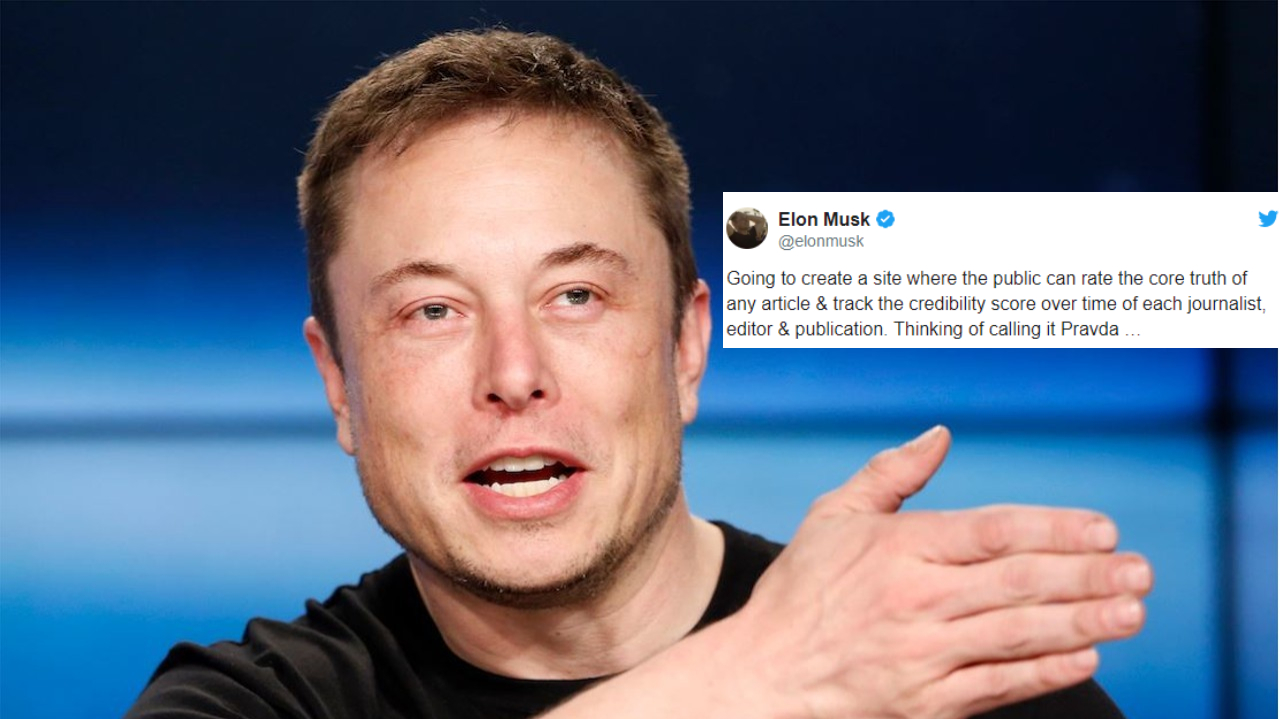After taking on global warming through electric cars, the earth’s inevitable eventual destruction through space travel, and the potential rise of artificial intelligence through brain-computer interfaces, Elon Musk has set his sights on fixing what he considers the biggest that plagues humanity at the moment — fake news.
Musk, in one of his periodic Twitter stream-of-consciousness sessions, has declared that he’s “going to create a site where the public can rate the core truth of any article & track the credibility score over time of each journalist, editor & publication.” He’s added that he’s considering calling it Pravda, after the official newspaper of the communist Soviet Union.
Going to create a site where the public can rate the core truth of any article & track the credibility score over time of each journalist, editor & publication. Thinking of calling it Pravda …
— Elon Musk (@elonmusk) May 23, 2018
While fake news is a problem that has the entire world worried, it does seem to hold personal significance for Musk. Musk seems to be particularly disturbed by how Tesla is covered by the press, and just prior to his Pravda announcement had launched into a scathing critique of the media. “The holier-than-thou hypocrisy of big media companies who lay claim to the truth, but publish only enough to sugarcoat the lie, is why the public no longer respects them,” he’d tweeted while sharing an article from an independent blog which said that media’s negative coverage of Tesla was increasingly having no effect on its stock price.
Musk seems to think that Tesla gets a bad rap in the news because it doesn’t advertise. “Problem is journos are under constant pressure to get max clicks & earn advertising dollars or get fired. Tricky situation, as Tesla doesn’t advertise, but fossil fuel companies & gas/diesel car companies are among world’s biggest advertisers,” he said.
Musk’s diatribe immediately raised comparisons to another famous figure who’s spent the last year or so bashing the media — US President Donald Trump. But he was ready with a response. “Anytime anyone criticizes the media, the media shrieks “You’re just like Trump!” Why do you think he got elected in the first place? Because no ones believes you any more. You lost your credibility a long time ago,” he admonished a reporter.
And while Musk seems to be tweeting aloud his media credibility site idea, he’s already getting some basics in place. People pointed out that a crowd-sourced version of the truth could be susceptible to gaming, so Musk has said that his site will have mechanisms to filter out botnets. And he believes that even if the public doesn’t check the credibility score of the publications with each article they read, the existence of the score itself would keep journalists in check. “Even if some of the public doesn’t care about the credibility score, the journalists, editors & publications will. It is how they define themselves,” he said.
Even as Twitter was reacting to Musk’s pronouncement either with bewilderment or loud cheers, he decided to settle things in typical decisive fashion. Musk put out a Twitter poll asking if his idea was any good, or if things in the media were okay as they were. And the public — at least the people who follow Musk — were unequivocal in their support, with 89% of the over 90,000 voters urging him to go ahead with his plan.
Create a media credibility rating site (that also flags propaganda botnets)
— Elon Musk (@elonmusk) May 23, 2018
It could be easy to dismiss Musk’s announcements as mere Twitter bravado, but he’s followed up with some pretty bold proclamations in the past. Last year, while stuck in traffic, he’s tweeted that it would be good idea to dig tunnels under cities to help fix urban congestion, and months later had started digging tunnels for the Boring Company. And while getting the Boring Company off the ground required permissions from authorities, tests by engineering teams, and entire tunnel digging machines, setting up a website that lets users vote on the veracity of news stories would sound like a weekend project for Musk.
But that’s where things might turn tricky. The truth is pretty elusive at the best of times, and while letting a clique of journalists to hold sway on it is certainly less than ideal, opening it up for a public vote might open up a new Pandora’s box altogether. There’s a real danger that Musk’s proposed site could eventually turn the truth into a global popularity contest, with the side with the greatest numbers eventually getting to dictate their narrative. There are issues for Musk to iron out, but his idea has come at the right time — the news media is broken, and needs a large concerted effort to fix it. And while Musk has previously sent rockets into space, and Tesla cars into orbit, fixing the media could be his biggest test of all.
